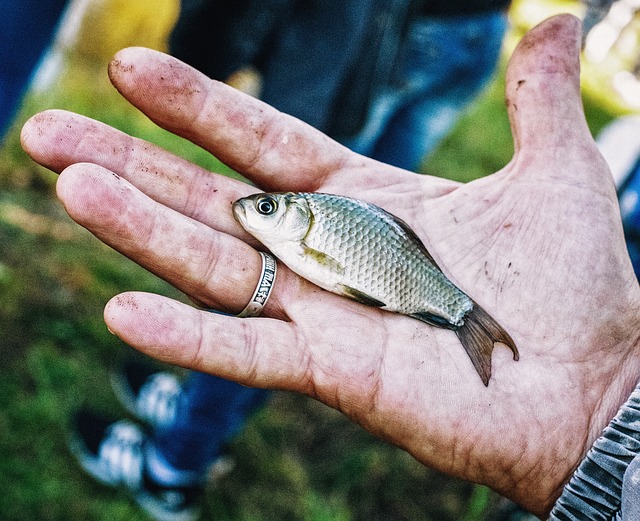The fishing hook fantasy

Why do so many survival kit suggestions have fishing gear in them?
Over the years I’ve noticed that survival/escape/bugout/get-home kit contents always seem to include fishing gear. I don’t mean poles, reels, and aluminum boats with fish-finding radar, but hooks, line, and perhaps some weights.
The idea is that if you’re stranded somewhere you can pull out the hooks, attach them to some line, and drop them in the nearest body of water and — like magic — life-sustaining fish will leap to your salvation.
No one ever stops to question whether that’s a good idea to being with.
If you’re not good, you’d better be lucky
I don’t claim to be a great fisher-person, but I did grow up fishing on a regular basis. From the time I was about six years old or so, I was allowed to go down to the pond on the south end of our farm and fish. As I got older, I’d go fishing in the local rivers and lakes with my Dad. At one point in my early adulthood, Dad bought a small boat and we went fishing (and crabbing) in the Pacific.
So while I’m not an avid fish-catcher, and haven’t been fishing in perhaps a decade, I do have a little bit of time behind a pole. I know my own limitations, and I wouldn’t rely on my pole and tackle box for sustenance in any sort of emergency. I know how hard it is to catch fish when you really want to, and that’s using every technological advantage modern man has in the eternal piscine struggle.
Many years ago I tried using the emergency fishing kit from my bugout bag in a well-stocked lake. I didn’t get so much as a nibble, which didn’t surprise me at all. I can’t imagine being cold, tired, and hungry and still waiting patiently for Charlie The Tuna to grab on and say “here’s supper!”
Emergencies never happen at the fish market
That’s not the least of it. If I can’t catch a fish under ideal conditions with that stuff, how about non-ideal conditions? How many fishing enthusiasts who live in urban or suburban areas travel some distance just to snag a trout or bass? There’s a reason they don’t fish close to home, and that’s because there aren’t any fish there.
Think about the bodies of water you pass on your way home from work. How many of them have any amount of fish in them? Not very many, I’d wager, making the emergency subsistence fishing idea seem more than a little optimistic.
What do you do if you catch one? I’m a huge fan of sushi, but even in an emergency I’m going to give second and third thoughts to eating a freshwater fish raw. Now you also need fire and something to cook it in. How many of those emergency kits come with cookware?
Why are you doing this?
What I’m getting at is the need to question what you’re told. Lots of folks, like me at one time, dutifully put emergency fishing gear into our kits because someone authoritative said we should. That was that.
It seems like a good idea on the surface, but when you dive deeper into critical thinking things start to sink. Once you get to that point, you realize that there might just be something more useful which could take up that space in the kit.
The same is true for any item or skill in your self defense and preparedness inventory. Anything you have, tangible or not, requires that you spend time, effort, money, and space to acquire it. Those things which aren’t really useful to you and your family, in the likely situations you’ll find yourself, might actually be a waste of those resources.
And leave you less prepared than you thought you were.
Revisit your plans and preps
This comes to mind as my wife and I are revisiting our preparedness and self defense plans. We haven’t done this for a few years — more than is advisable — and already we’re questioning some of what we did in the past. Sometimes this is because situations have changed, but other times it’s simply because we know more than we did then. We’re more discerning, more thoughtful, and less concerned with what others think.
If we spent our time piling on more and more preparations without thought to what we were really doing, we might be in a position of having too much of the wrong stuff. We might find ourselves doing more of the wrong things because of a bad decision, or a bad understanding, five or ten or more years ago. We might be putting in more fishing line and hooks, instead of thinking about when and where we’d really be using them.
Never assume your past decisions were the correct ones. They may have (or may not have) been, then, but things may have changed. You may have evolved.
Beware of this introspection, though, because it can be a blow to one’s psyche. You may have to come to grips with bad decisions, and you may find yourself needing substantial changes in the way you do things now. It’s not a process for those who can’t handle the truth.
But if you’re strong enough, it’s how you become more prepared, more resilient. And finally do away with those hooks and sinkers.
– Grant
P.S.: As we revisit our preparedness planning, we’re using the tools and concepts in my book Prepping for Life: The balanced approach to personal security and family safety. It’s structured way of leading you through the steps to figure out what you really need to prepare for is exactly the antidote to bad decision-making. Of course you can get it in Kindle, iBooks, and electric-grid-failure-proof paperback!
Listen to this blog – and subscribe to it on iTunes by clicking this link!
- Posted by Grant Cunningham
- On June 18, 2018

